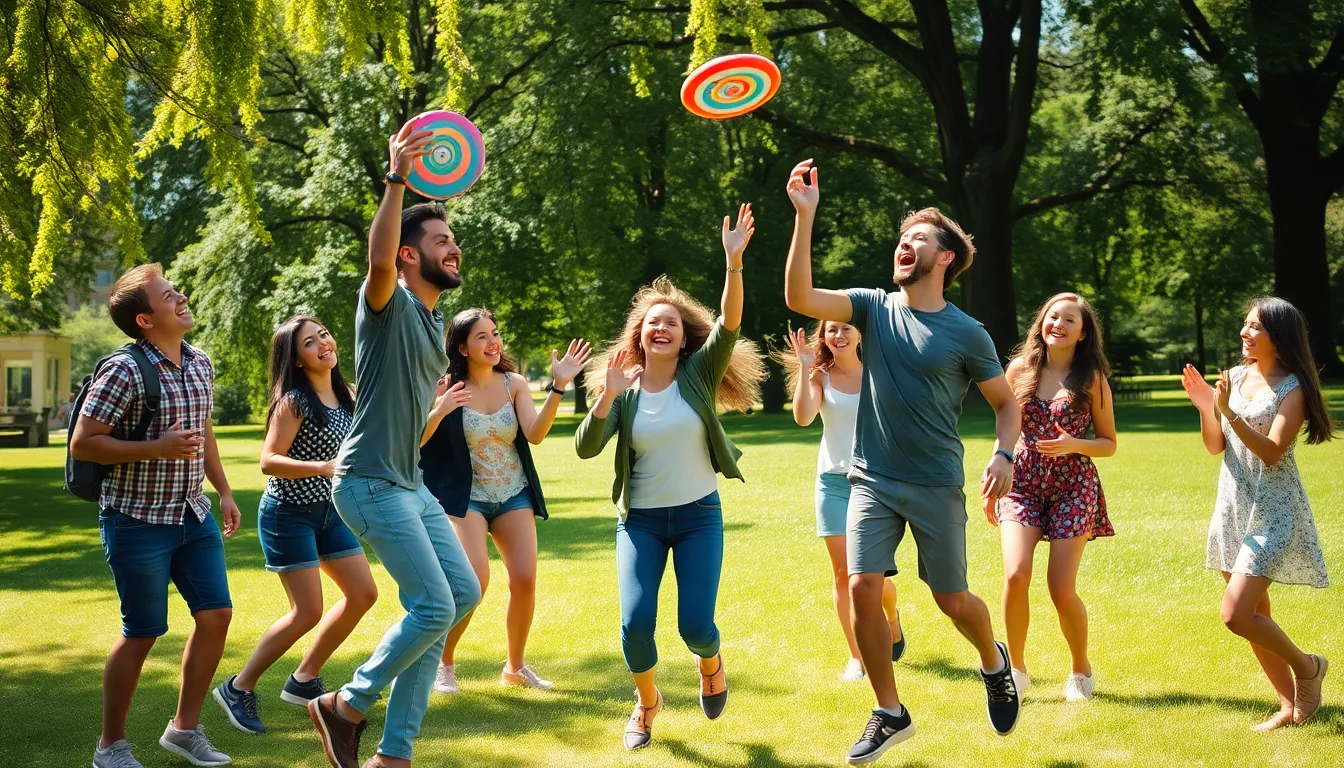Table of Contents
ToggleWhen it comes to breaking the ice or turning a dull gathering into an unforgettable adventure, group games are the secret sauce. Whether it’s a family reunion, a team-building event, or just a casual get-together, these games pack a punch of fun and laughter. Who knew that a little friendly competition could unleash such joy?
What Are Group Games?
Group games involve activities designed for multiple participants, fostering interaction and teamwork. These games often provide entertainment during social gatherings, encouraging camaraderie among players. Typically, they include competitive elements, but friendly play usually dominates the atmosphere.
Common types of group games span various categories. Card games, for instance, like Uno and Poker, invite strategic thinking and cooperation. Outdoor games such as Capture the Flag or Tug of War require physical engagement and enhance group bonding. Interactive games often incorporate problem-solving exercises to facilitate engagement.
Establishing rules and objectives is crucial for effectively organizing group games. Clear instructions ensure everyone understands the expectations and can participate fully. Group leaders often modify rules based on players’ ages and skill levels to promote inclusivity.
Signing up for games in advance can also enhance participation. Pre-registration helps organizers gauge interest, ensuring enough supplies and space for everyone involved. Familiarity with the chosen games can heighten excitement and anticipation among players.
Enjoyable experiences during group games contribute significantly to social interaction. Laughter and joy often emerge as participants navigate challenges together. Engaging in these activities promotes a sense of belonging and can strengthen relationships among friends, family, or co-workers.
Types of Group Games

Group games can be categorized into indoor and outdoor activities, each offering unique experiences. These games enhance engagement and strengthen relationships among participants.
Indoor Group Games
Board games like Monopoly and Scrabble provide entertainment and encourage strategic thinking. Charades and Pictionary foster creativity and teamwork while generating laughter. Trivia contests challenge knowledge across various topics and stimulate friendly competition. Card games such as Uno and Poker create opportunities for collaboration and lively interactions. Escape room games promote problem-solving skills as teams work together to solve puzzles within a time limit. Various options ensure that everyone finds a game that matches their interests and preferences.
Outdoor Group Games
Outdoor games include classic activities like Capture the Flag and Tug of War, which promote physical activity and bonding. Relay races involve teamwork and excitement as participants race in groups, enhancing camaraderie. Frisbee and volleyball encourage friendly competition while being accessible to all ages. Scavenger hunts involve searching for items based on clues, adding an adventure element to gatherings. Group sports such as soccer and basketball offer structured competition while improving communication and cooperation skills. These games invite excitement and create lasting memories in shared outdoor experiences.
Benefits of Playing Group Games
Group games offer numerous advantages that enhance social experiences. Engaging in these activities promotes interaction and strengthens connections among participants.
Social Interaction
Playing group games enhances communication skills among participants. Individuals interact with one another, fostering relationships in a relaxed setting. Active participation encourages sharing ideas, leading to meaningful conversations. Engaging in lighthearted competition breaks the ice in social gatherings. Players enjoy moments of laughter, creating memorable experiences together. These games also support diverse participation, allowing everyone to feel included regardless of their background. Encouraging teamwork through games boosts participation and can lead to lasting friendships. Shared successes and failures unite participants, promoting a greater sense of community.
Team Building
Group games serve as effective team-building tools, especially in professional settings. They encourage collaboration, helping teams work towards common goals. Engaging in challenges promotes problem-solving skills collectively. Games that require strategy enhance analytical thinking, benefiting all participants. Improved trust and communication among team members foster a positive work environment. More than just fun, group games build camaraderie, facilitating connections that extend beyond the activity. Engaging in physical games can also promote healthy competition, motivating teams to excel together. These benefits contribute to increased morale and productivity within teams.
Popular Group Games to Try
Group games offer excitement and engagement, making them ideal for social gatherings. Below is a list of popular choices.
Classic Group Games
Classic games never go out of style. Charades engages players in guessing through actions, promoting laughter and teamwork. Board games like Monopoly invite strategic thinking while sparking friendly competition. Capture the Flag energizes outdoor gatherings, requiring teamwork and strategic planning. Tug of War tests strength and coordination, making it a classic choice for group fun. These games often evoke nostalgia and foster connection among participants.
Modern Group Games
Modern games add fresh excitement to group activities. Escape room challenges immerse participants in problem-solving scenarios, requiring collaboration to succeed. Trivia contests stimulate conversation, encouraging friendly rivalry over unique topics. Card games like Cards Against Humanity introduce humor and creativity, appealing to diverse age groups. Virtual reality games provide an innovative twist, engaging players in immersive experiences. These contemporary options keep group dynamics lively and engaging, ensuring unforgettable moments.
Tips for Organizing Group Games
Organizing group games requires careful planning and communication. Begin with a clear objective to guide the event’s direction. Setting a specific date and time ensures that participants can adjust their schedules accordingly. Establish a list of games suited for your audience, considering both indoor and outdoor options that accommodate various preferences and abilities.
Invite participants well in advance to generate excitement. Utilize social media or group messaging platforms to share updates and gather RSVPs. Create an inclusive environment by ensuring games appeal to diverse age groups and interests. Clearly outline the rules and objectives for each game, making them easily accessible to all attendees.
Provide necessary materials for the games, such as boards, cards, and any other supplies. Ensure there are enough resources for all participants to engage actively. Schedule breaks to give everyone a chance to socialize and recharge, which can enhance the overall experience.
Designate a game facilitator or host who can guide activities smoothly. This person can address questions, handle any disputes, and maintain a fun atmosphere. Encourage positive interactions by emphasizing teamwork and friendly competition. Remind participants that the primary goal is to enjoy themselves and foster connections.
Gather feedback after the event to learn what worked well and what can improve future gatherings. Use this feedback to create a better experience next time. By following these tips, organizing group games can lead to memorable experiences filled with laughter and camaraderie.
Group games are more than just a source of entertainment; they create lasting memories and strengthen bonds among participants. Whether indoors or outdoors, these activities foster teamwork and communication, making any gathering more enjoyable. With careful planning and consideration of participants’ preferences, organizers can ensure that everyone feels included and engaged.
The laughter and friendly competition that arise during these games can transform ordinary moments into extraordinary experiences. As people come together to play, they build connections that can lead to lasting friendships and improved collaboration in professional settings. Embracing the joy of group games is a surefire way to enhance social interactions and create a sense of belonging.







